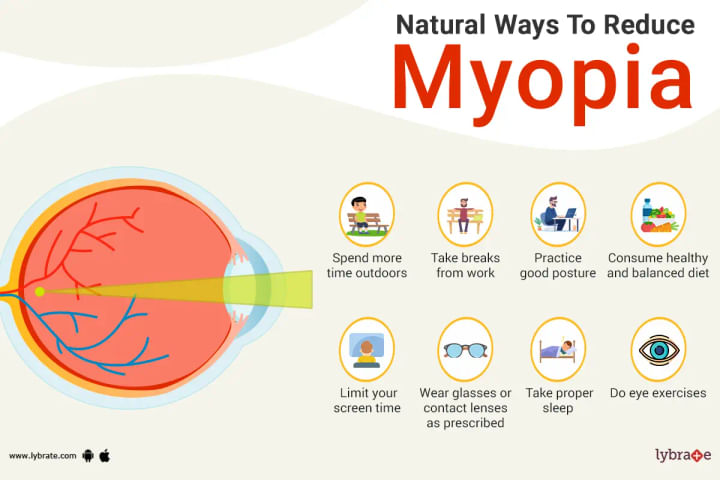Get the App
For Doctors
Login/Sign-up
Last Updated: Jul 05, 2024
BookMark
Report
8 Ways to Reduce Myopia Naturally
What is Myopia?
Myopia, also known as nearsightedness, is a vision disorder in which close objects appear clearer than distant objects. It is caused by an imperfection in the eye where the light that enters isn’t focused correctly and instead of being focused on the back of the eye, it focuses in front of it.
What are the signs and symptoms of Myopia?
The common signs and symptoms associated with myopia include:
- Blurry vision when looking at distant objects (with clear vision when looking at close items)
- Squinting or headaches when trying to see distant objects
- Difficulty seeing objects in low light conditions
- Eye fatigue and strain after prolonged reading or computer use
- Difficulty driving at night due to glare from oncoming headlights
What are possible complications of Myopia?
Complications of Myopia include:
- A higher risk of eye diseases, particularly those caused by a thinning retina such as retinal detachment and glaucoma.
- Cataracts may develop at a younger age than those without myopia due to the additional strain on the lens created by the myopic lenses.
- Strabismus (crossed eyes) or amblyopia (“lazy eye”) can result when one eye sees more clearly than the other and causes it to become weaker than its counterpart.
- Individuals with high degrees of myopia can suffer from decreased visual field and night vision disturbances which can lead to impaired driving.
- Myopic maculopathy is a condition in which the macula (the most sensitive area at the centre of the retina) becomes damaged from too much stress due to high amounts of near work such as reading or using a computer for extended periods of time.
8 Ways to Reduce Myopia Naturally
- Follow a healthy diet: Eating foods that are high in vitamins A and C can help improve vision health by reducing inflammation caused by oxidative stress from ultraviolet rays emitted through screens and natural sunlight exposure. Foods like oranges, bell peppers, blueberries, spinach, kale, almonds, eggs, salmon and apricots have been found to have beneficial effects when it comes to maintaining healthy vision as well as reducing myopia progression in children and teens who are genetically predisposed to it.
- Spend some time outdoors each day: Natural sunlight helps to reduce the development of Myopia. Try to spend at least 15-20 minutes outdoors every day in a safe place with sufficient UV protection.
- Make sure your reading material is placed slightly further away from your eyes: Reading glasses help keep your eyes at the optimal viewing distance when you have objects close up in front of you, such as books or computer screens; so make sure you have them on when necessary and position them correctly for the most comfortable viewing experience.
- Make use of Ayurvedic remedies: Apply a warm compress made with Castor oil and wash off after 20-30 minutes twice daily over closed eyelids to reduce strain and improve vision health overall; massage sweet almond and sesame oils around your eyes which can help relieve soreness and lift fatigue; also use oikos eye drops to lubricate, soothe swelling and prevent inflammation due to dryness or exposure to computers, televisions etc.,
- Take breaks periodically while using electronics such as phones or computers: Staring at bright screens can be taxing on the eyes and increase overall eye strain leading to vision issues if not managed properly; try taking short breaks every 20-30 mins from digital devices where appropriate in order to give your eyes some relief.
- Exercise the eyes: Have your child do Vision Therapy exercises that help strengthen the eye muscles and improve their focusing ability. These exercises can also be done by playing with specialised toys or looking at eye charts. some of the exercises are:
- Favourite focus: Have your child alternate between focusing on something far away (like a wall clock) and something close up (like a bookmark) and then back. Doing this repeatedly strengthens the focusing ability of the eye muscles and helps reduce nearsightedness.
- Follow My Finger: Have your child track your finger with his or her eyes as you move it from side to side in front of them. Again, this helps strengthen the eye muscles and is another way to help reduce myopia.
- Vision Posture: It’s important to maintain good posture while reading or doing close work, as it allows the eyes to focus properly without having to strain them too much. Make sure your child sits up straight, looks directly at what they’re reading/working on with both eyes open, and keeps their head at a comfortable level above the book/work.
- Wear glasses or contact lenses: If an eye exam reveals that your child has myopia, fitting them with prescription eyeglasses or contact lenses can help improve their vision significantly by bending light in order to focus images more clearly onto the retina. Some of the glasses used are:
- Single vision: These use one power throughout the entire lens;
- Bifocal: These have two powers in the lens; and progressive – these have a smooth transition between different powers.
- Educate your child on the importance of protection against UV rays: Make sure you protect your child’s eyes with sunglasses during sunny days to avoid UV rays exposure which can contribute to myopic progression over time if exposed frequently without protection against these rays.
If the above methods and remedies do not work then you can opt for surgical and medicinal treatments.
What are the surgical treatments for Myopia?
- Refractive Lens Exchange: Refractive lens exchange (RLE) is a surgical procedure in which the eye’s natural lens, which has become cloudy due to myopia, is replaced with an artificial, clear intraocular lens.
- Laser-Assisted In-Situ Keratomileusis (LASIK): LASIK is one of the most common laser treatments used to correct myopia. In this procedure, the corneal flap is created and folds back while reshaping it with an excimer laser beam.
- Photorefractive Keratectomy (PRK): PRK is a type of laser eye surgery used to correct myopia and astigmatism by reshaping the cornea using an excimer laser to remove tissue from its surface.
- Implantable Collamer Lens (ICL): Implantable collamer lenses are surgically placed between the iris and the natural lens of your eye, allowing for refractive error correction without having to rely solely on glasses or contact lenses.
Best doctors to consult for Myopia
When consulting a doctor for myopia, it is important to find an ophthalmologist who specialises in this condition. An ophthalmologist has the required experience and expertise to diagnose and treat myopia.
- Ophthalmologist: The ophthalmologist is the physician who specialises in diagnosing and managing diseases and conditions of the eye. They typically evaluate, diagnose, and treat vision issues, as well as perform surgeries to correct vision problems. They can also prescribe glasses or contact lenses to correct refractive errors, such as myopia (or nearsightedness) and may recommend LASIK surgery to correct more severe myopia.
- Optometrist: Patient, from your test results, it looks like you have myopia. Myopia is a type of refractive error which causes far away objects to look blurry. To correct this, we can use eyeglasses, contact lenses, or potentially corrective surgery to improve your vision.
- Orthoptist: An orthoptist is a specialised healthcare professional who specialises in the field of vision science and eye care. They are trained to diagnose and treat conditions affecting the visual system, including strabismus (misalignment of eyes), amblyopia (“lazy eye”), nystagmus (involuntary eye movements), and myopia (near-sightedness).
- Optician: A qualified optician can provide you with a comprehensive eye exam to diagnose the diagnosis of your myopia and discuss treatment options such as glasses, contact lenses, or refractive eye surgery.
In case you have a concern or query you can always consult a specialist & get answers to your questions!



+1.svg)
